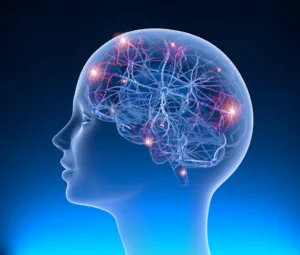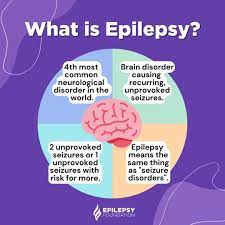Epilepsy is a neurological condition involving the brain that makes people more susceptible to having recurrent unprovoked seizures. It is one of the most common disorders of the nervous system and affects people of all ages, races and ethnic background. According to the CDC, almost 3 million Americans live with epilepsy and nearly 200,000 people in the U.S. develop this condition annually.
Anything that interrupts the normal connections between nerve cells in the brain can cause a seizure; this includes a high fever, low blood sugar, alcohol or drug withdrawal, or a brain concussion. Under these circumstances, anyone can have one or more seizures. However, when a person has two or more recurrent unprovoked seizures, he or she is considered to have epilepsy. There are many possible causes of epilepsy, including an imbalance of nerve-signaling chemicals called neurotransmitters, tumors, strokes, and brain damage from illness or injury, or some combination of these. In the majority of cases, there may be no detectable cause for epilepsy.
Epilepsy is the fourth most common neurological disorder in the world. If you have epilepsy, surges of electrical activity in your brain can cause recurring seizures.
Epilepsy is a brain disorder that causes recurring, unprovoked seizures. Your doctor may diagnose you with epilepsy if you have two unprovoked seizures or one unprovoked seizure with a high risk of more. Not all seizures are the result of epilepsy. Seizures may relate to a brain injury or a family trait, but often the cause is completely unknown.
The word “epilepsy” simply means the same thing as “seizure disorders.” It does not state anything about the cause of the person’s seizures or their severity.
The brain is the center that controls and regulates all voluntary and involuntary responses in the body. It consists of nerve cells that normally communicate with each other through electrical activity.
A seizure occurs when part(s) of the brain receives a burst of abnormal electrical signals that temporarily interrupts normal electrical brain function. Seizures are sudden surges of abnormal and excessive electrical activity in your brain and can affect how you appear or act. Where and how the seizure presents itself can have profound effects.
WHAT TRIGGERS THE SEIZURE TO OCCUR:
Some people may find that seizures occur in a pattern or are more likely to occur in certain situations. Sometimes these connections are just by chance, but other times it’s not. Keeping track of any factors that may come before a seizure (also called seizure triggers) can help you recognize when a seizure may be coming. You can then be prepared and learn how to lessen the chance that a seizure may occur at this time.
Some people will notice one or two triggers very easily. For example, their seizures may occur only during sleep or when waking up. Other people may notice that some triggers bother them only when a lot is going on at once or during a “high risk” time for them, like when they are under a lot of stress or sick.
Those triggers that could make the seizure occur:
– Specific times of the day or night
– Sleep deprivation – overtired, not sleeping well, not getting enough sleep, disrupted sleep
– Illness (both with or without a fever)
– Flashing bright lights or patterns
– Alcohol, including heavy alcohol use or alcohol withdrawal
– Drug use – use of cocaine and other recreational drugs such as Ectasy or any drug your taking especially for fun.
– Stress
– Missed medications, especially those for epilepsy.
– Menstrual cycle or other hormonal changes.
– Not eating well, long times without eating, dehydration, not enough fluids. low blood sugar, vitamin and mineral deficiencies.
– specific foods like excess caffeine, which also helps you become dehydrated if that is your major drink of the day.


